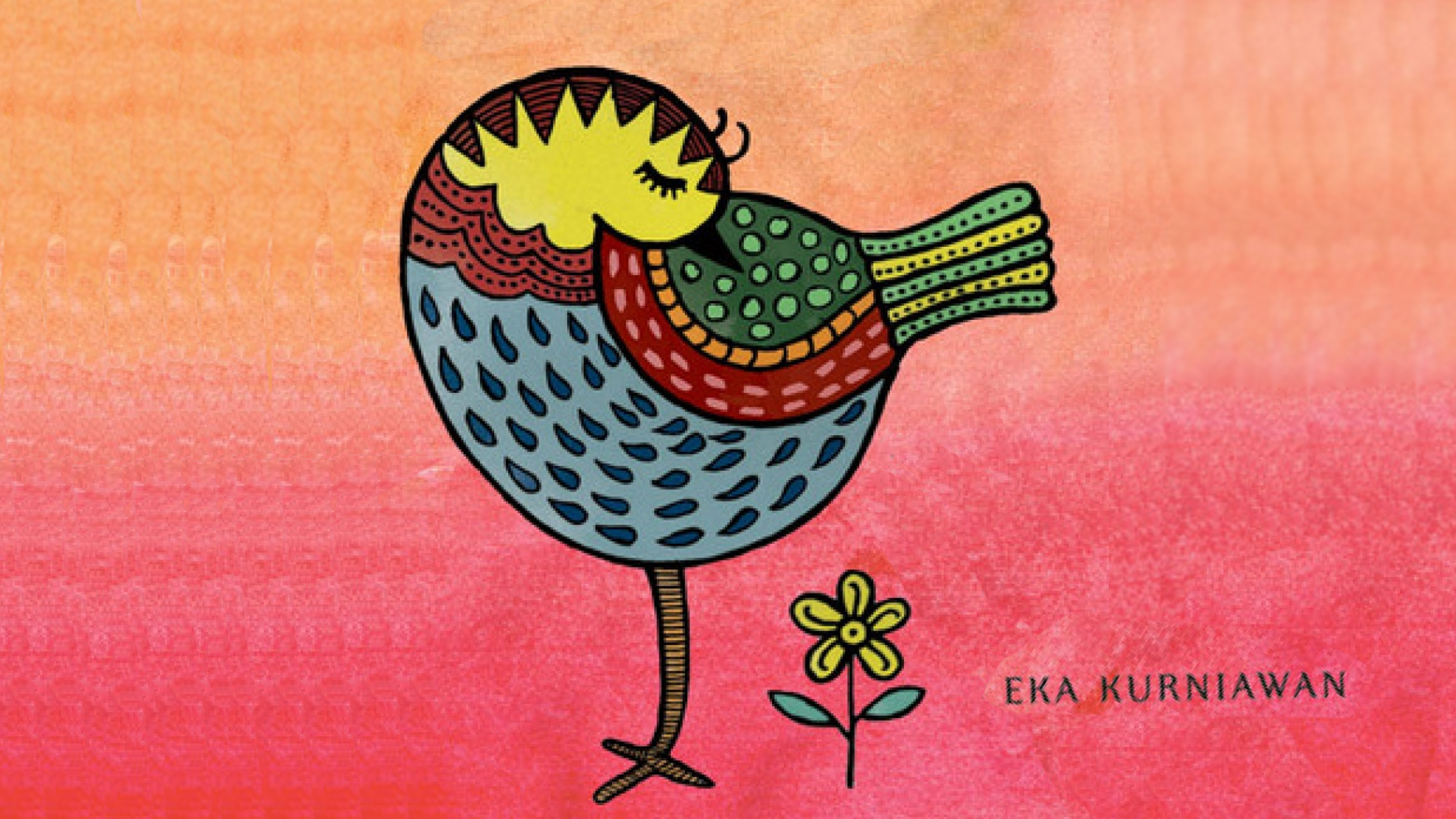What does a flaccid penis look like? Eka Kurniawan, the Indonesian writer who burst onto the world lit scene in 2015, describes it as a newly hatched bird: ugly-cute, small, vulnerable. Still, this little bird looms large in his third novel Vengeance Is Mine, All Others Pay Cash, published in Indonesian in 2014. In the catalyzing event, young village peeping tom Ajo Kawir witnesses a rape perpetrated by two policemen. The victim is a woman who lost her mind after her husband was murdered in dubious circumstances characteristic of the late Suharto regime. Deeply traumatized, Ajo Kawir is rendered permanently impotent.
Scenes of sexual assault are part of an Indonesian literary tradition that developed under the New Order. Starting on September 30, 1965, just twenty years after Indonesia had won the war for its independence, members and affiliates of the communist party—then one of the largest parties in Indonesia—were murdered over the course of weeks and many more thrown in jail. Low estimates of the dead start at 500,000. Suharto took power and held it for more than thirty years, emphasizing rapid economic development and stifling free expression, continuing to exile, imprison and “disappear” those who would dissent.
The journalist and fiction writer Seno Gumira Ajidarma famously said that when journalism is silenced, literature must speak. The literary depiction of rape has in part been a metaphoric way to voice the ravaging terror of Suharto’s dictatorship, the silencing of tribal traditions, the desecration of natural beauty and the erection of cities built on pillaged resources. It bespoke a tragic pessimism, and plot-wise often led to complete psychic disintegration. Then as depicted by women writers such as Djenar Maesa Ayu leading up to and immediately after Suharto’s fall, sexual assault and abuse was a metonym for the horrors of patriarchy. For these women who felt themselves challenging waning (sexist) feudal and waxing (sexist) neocolonialist authorities at the same time, rape didn’t lead to resignation but held the seeds of transformation. Defilement was not the end of the story, nor the sum total, but just the beginning.
In his previous novels, Eka has celebrated strong female protagonists and played with these tropes, for example with his character Dewi Ayu, who in Beauty Is a Wound is sold into sex slavery for the Japanese during Indonesia’s fight for independence and goes on to outwit and outlive all manners of men, living and undead. In Vengeance, rape leads to reinvention too, but this time for a man. Ajo Kawir must find a new way of being in the world with few role models. First he blindly fights, then discovers true satisfaction in pleasing a woman, and finally achieves a wise asceticism, following the Way of his serene penis.
In the book’s original Indonesian, “penis” is most often indicated by the word burung, which means bird but is common slang for the male member. A literal translation of the phrase most commonly used to describe Ajo Kawir’s condition is: the bird can’t stand up. While translating the novel, I had to decide whether or not to use this phrase. Ultimately I called upon other English slang for penises and erections or lack thereof—pecker and cock, for example, are both close to “bird” but I didn’t want to overuse them since to me they too specifically evoked chickens, which was not the idea. I ended up using the direct translation frequently. The word and concept seemed so important to the book; in other works I’ve translated, Eka usually uses the gender-neutral kemaluan, akin to genitals, “privates”. But even both versions of the Indonesian book-jackets, which Eka designed, feature birds, the first with its head tucked under its wing, the second plummeting to the ground, its heart exposed, feathers flying. Indonesia’s national emblem, like America’s, is a bird, the garuda. With this polyvalent pun, then, Eka is skewering political machismo, the lust for domination that confuses paternalism with sadism, suggesting instead that the violence perpetrated by the Indonesian nation state is a front for a fundamental impotence.
At the same time, the novel explores the generative potential of male passivity. A quiet dick actually comes as a big relief—and in the novel its modest retreat makes room for female strength, desire, and authority. While nostalgic for a time when he could experience pleasure himself, Ajo Kawir ultimately falls for and learns from a woman fighter, Iteung, who steals the show with her self-knowledge, grit, and courage both in vengeful combat and in grappling with her complex desires.
My translation of Vengeance was published in English in August of 2017, almost a year into Trump’s presidency and the rising foment of the #MeToo movement which was about to sound and accelerate on a global scale. Soon after its English publication, then, the Indonesian tradition of literary rape dovetailed with a new American and global understanding of the sexual realities of women, and the potential reading of the novel expanded. Rape is not a metaphor, and more than a metonym. What might have otherwise seemed hyperbolic alighted on the literal, becoming the depiction of a suddenly obvious fact of life.
A book about rape centered on a dick that can’t get hard may not seem like progressive gender politics outside of the context of Indonesia’s political history and literary conventions. But within that context, it’s downright romantic. Eka dedicated the book to his wife, the writer Ratih Kumala, and Indonesian critics hailed it as a “love letter”. Limp dick is a portal into an alternate universe where the penis is not the essential emblem of manhood nor a tool of violence for gendered power structures desperate to prove that they can “stand up”, where men might be eager to defer to women in rewriting the scripts of mutual desire. Alternative masculinity post #MeToo is still a hatchling, here and in Indonesia—I will be reading Eka’s work to see how it might grow and spread its wings.






